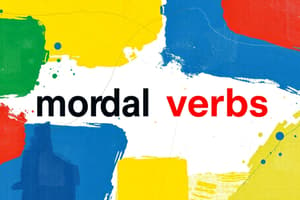Podcast
Questions and Answers
What is a characteristic of modal verbs concerning their form and subject?
What is a characteristic of modal verbs concerning their form and subject?
- Modal verbs require 'to' before the main verb.
- Modal verbs change form according to the subject.
- Modal verbs do not change form according to the subject. (correct)
- Modal verbs can be used as main verbs.
Which modal verb is used to express strong obligation or necessity?
Which modal verb is used to express strong obligation or necessity?
- Can
- Should
- Must (correct)
- Might
When would you typically use 'could' instead of 'can'?
When would you typically use 'could' instead of 'can'?
- To express informal permission.
- To suggest a possibility.
- To express past ability. (correct)
- To indicate current ability.
What is the appropriate way to request formal permission?
What is the appropriate way to request formal permission?
Which modal verb is correctly used to give advice?
Which modal verb is correctly used to give advice?
Flashcards are hidden until you start studying
Study Notes
Modal Verbs Rules
- Modal verbs are auxiliary verbs that express necessity, possibility, permission, or ability.
- Common modal verbs include: can, could, may, might, must, shall, should, will, would.
- Modals do not change form according to the subject (e.g., "I can," "he can").
- They are followed by the base form of the main verb (e.g., "She can swim").
- Modals do not use "to" before the verb (e.g., "You should go," not "to go").
Modal Verbs Usage
- Ability: Indicates someone's capability (e.g., "She can dance").
- Permission: Grants or requests consent (e.g., "May I leave?" or "You may go").
- Possibility: Suggests something that may happen (e.g., "It might rain").
- Necessity: Expresses requirements or obligations (e.g., "You must finish your homework").
- Advice: Offers recommendations (e.g., "You should see a doctor").
Difference Between Can And Could
- Can:
- Present ability (e.g., "I can play the guitar").
- Informal permission (e.g., "You can use my phone").
- Could:
- Past ability (e.g., "I could swim when I was five").
- Polite requests or suggestions (e.g., "Could you help me?").
Indicating Ability And Permission
- Indicating Ability:
- Use "can" for current abilities (e.g., "He can speak three languages").
- Use "could" for past abilities (e.g., "She could run fast as a child").
- Indicating Permission:
- Use "can" for informal situations (e.g., "Can I borrow your pen?").
- Use "may" or "might" for formal permission (e.g., "May I open the window?").
Expressing Necessity And Advice
- Expressing Necessity:
- Use "must" for strong obligations (e.g., "You must wear a seatbelt").
- Use "have to" for external obligations (e.g., "I have to attend a meeting").
- Expressing Advice:
- Use "should" for suggestions (e.g., "You should eat more vegetables").
- Use "ought to" for moral obligations (e.g., "You ought to help your neighbor").
Modal Verbs Rules
- Modal verbs are auxiliary verbs used to express necessity, possibility, permission, or ability.
- Common modal verbs include can, could, may, might, must, shall, should, will, and would.
- Modal verbs maintain the same form regardless of the subject (e.g., "I can," "he can").
- They are followed by the base form of the main verb (e.g., "She can swim").
- Modals do not require "to" before the verb (e.g., "You should go," not "to go").
Modal Verbs Usage
- Ability: Expresses someone’s capability (e.g., "She can dance").
- Permission: Used to grant or request consent (e.g., "May I leave?" or "You may go").
- Possibility: Indicates a potential occurrence (e.g., "It might rain").
- Necessity: Describes obligations or requirements (e.g., "You must finish your homework").
- Advice: Offers recommendations (e.g., "You should see a doctor").
Difference Between Can And Could
- Can:
- Used for present ability (e.g., "I can play the guitar").
- Utilized for informal permission (e.g., "You can use my phone").
- Could:
- Represents past ability (e.g., "I could swim when I was five").
- Used for polite requests or suggestions (e.g., "Could you help me?").
Indicating Ability And Permission
- Indicating Ability:
- "Can" conveys current abilities (e.g., "He can speak three languages").
- "Could" signifies past abilities (e.g., "She could run fast as a child").
- Indicating Permission:
- "Can" is suitable for informal requests (e.g., "Can I borrow your pen?").
- "May" or "might" should be used for formal requests (e.g., "May I open the window?").
Expressing Necessity And Advice
- Expressing Necessity:
- "Must" conveys strong obligations (e.g., "You must wear a seatbelt").
- "Have to" indicates obligations imposed by external circumstances (e.g., "I have to attend a meeting").
- Expressing Advice:
- "Should" is used for general suggestions (e.g., "You should eat more vegetables").
- "Ought to" expresses moral obligations (e.g., "You ought to help your neighbor").
Studying That Suits You
Use AI to generate personalized quizzes and flashcards to suit your learning preferences.




